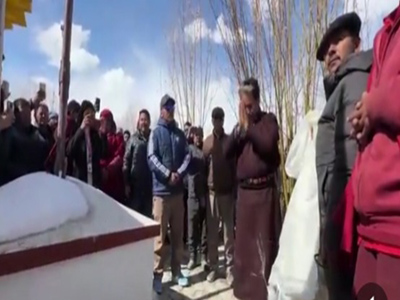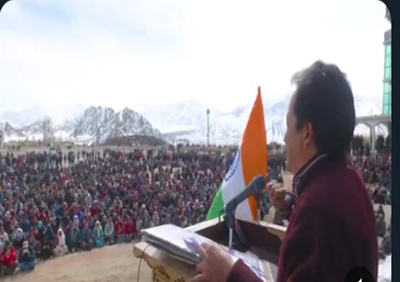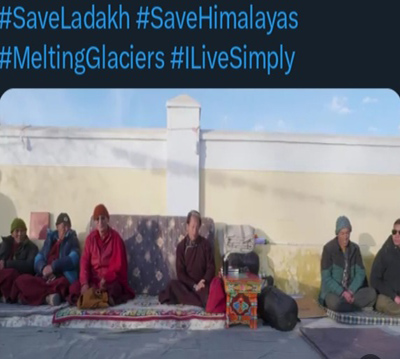Resorting to Gandhigiri, Ladakhi innovator, Magsaysay awardee Sonam Wangchuk started his 21 days long Climate Fast Unto Death in Ladakh as all talks with the Central Leadership remained a fiasco.
In a big rally held in Ladakh before initiating his 21-days long Climate Fast, Wangchuk directed his focus towards the BJP leadership, specifically Prime Minister Narendra Modi and Home Minister Amit Shah.
Sonam Wangchuk's 21 days long Climate Fast UntoDeath came on the heels of his similar fast last year in what had claimed to be world's first Climate Fast at his institute in Leh. But the Centre response to the fast remained lukewarm as the talks with the Centre turned out to be non-conclusive.
As far as BJP is concerned, Sonam Wangchuk's demand of imposition of schedule 6 in Ladakh remains untenable.
The Modi government has annulled Article 370 and 35 A from Jammu and Kashmir in 2019, created two UTs of Jammu and Kashmir and Ladakh.
But by giving exclusive status to Ladakh will amount to the special status that makes mockery of BJP's stance on "special status", say analysts.
However, Sonam Wangchuk said the fast will be in stages of 21 days each is extendable till death and till the Centre does not fulfill their demands. .
He reminded them of the promises made in the BJP manifesto to safeguard Ladakhis under Schedule 6, which protects tribal communities and ensures their representation in the legislative assembly.
Wangchuk criticized the imposition of LGs (Lieutenant Governors) from outside Ladakh, emphasizing their lack of stake in protecting the region. LGs come and go after every three years or so, but Ladakh remain voiceless, he said.
Amid the context of the upcoming Lok Sabha elections in 2024, Wangchuk upped his demands, stating that the people of Ladakh would continue their protests in phases until their voices are heard.
He did not cite any data as to how the Ladakhis are being endangered by the vested interests and how Ladakh is up for sale.
Going back in time. Wangchuk highlighted Ladakh's historical plea to be directly integrated with Bharat Mata (Mother India) in 1947, which was unheeded.
In his impassioned speech, Sonam Wangchuk recounted Ladakh's historical battles, including engagements in 1900, 1948, 1962, 1971, and 1999, where Ladakhis stood shoulder to shoulder with Indian soldiers.
He underscored the sacrifices made by the people of Ladakh in defending the nation, emphasizing their unwavering commitment to Bharat Mata.
"Ladakh was a part of Kashmir due to historical mistakes," Wangchuk lamented, "but despite our plea for direct integration with Bharat Mata in 1947, our voices were not heard."
He expressed gratitude towards the Modi government for granting Ladakh Union Territory status in 2019 but criticized the lack of substantive measures to address Ladakh's concerns.
Wangchuk highlighted the vulnerability of Ladakh's ecology and culture to exploitation by external forces.
He condemned the absence of democratic representation in the form of a Legislative Assembly, which he argued left Ladakhis voiceless in decisions affecting their future.
"Today, we find ourselves at a crossroads," Wangchuk declared, "with our hands and feet tied, unable to protect our land from encroachment and exploitation."
He urged the government to fulfill its promises of protection under Schedule 6, emphasizing the need for democratic governance in Ladakh.
Drawing parallels with other states, Wangchuk appealed to the people of India to support Ladakh's cause.
He called for unity in advocating for Ladakh's interests, highlighting the collective responsibility to preserve the region's heritage and environment for future generations.
Despite being granted Union Territory status in 2019, Wangchuk accused the Modi government of neglecting Ladakh's development and leaving it vulnerable to exploitation by mining mafias and industrialists.
Wangchuk underscored the absence of a Legislative Assembly in Ladakh, depriving its citizens of democratic representation.
He advocated for the implementation of Schedule 6 to protect Ladakh's fragile ecology and culture, criticizing the government for failing to fulfill its promises.
In a stark warning, Wangchuk highlighted the detrimental impact of unchecked development projects on Ladakh's environment and livelihoods. He cited melting glaciers, climate change, water crisis and other eco-issues that need immediate concerns.
He called for greater public pressure on the government to prioritize Ladakh's protection, drawing parallels with other democratic regions in neighboring countries.
Wangchuk urged citizens across India to advocate for Ladakh's interests, emphasizing the collective responsibility to safeguard the future of Ladakh and its people.











